高三英语语法专项复习 反义疑问句
高考英语语法——反意疑问句(共11张PPT)
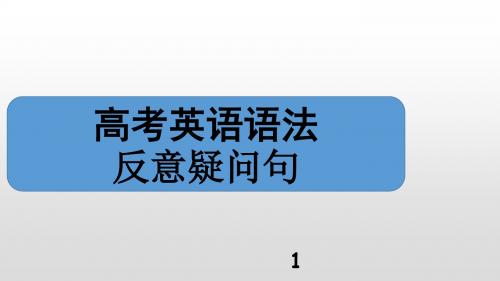
当陈述句部分含有主从复合句时,附加部分的代词和助动词 须与主句中的主谓保持一致。
You needn't do it since he has finished it, need you? It's the second time that you have sung that song, isn't it?
ome, shall we?
Let us go home, will you?
Open the door, will you?
5
need和dare既可以用作情态动词,又可以用作行为动词,所以在反意疑 问句中要准确判断其是情态动词还是行为动词。
He needn’t do it again, need he? He doesn’t need to do it again, does he? She dare say it, daren’t she? She doesn’t dare to say it, does she?
2
构成
The car is your father's, The girl doesn't sleep, The doctor can help you,
陈述句
isn't it? does she? can't he?
反意疑问句
be动词/情态动词/助动词 (not)+主语(代词)
3
前肯后否 前否后肯
He thinks that it will rain tomorrow, doesn't he? I think that it will rain tomorrow, won't it? They don't suppose that the film is moving, do they?
高三英语语法总复习_反义疑问句

高三语法总复习:反意疑问句反意疑问句又叫附加疑问句。
它表示提问人寻求同意或没有把握,需要对方证实。
它由两部分组成:前一部分是一个陈述句,后一部分是一个简短的疑问句(be/ can…/ do, does, did, have, has, had+人称代词主格?),两部分的人称时态应保持一致。
注意:反义疑问句的否定形式一定要用缩略形式.Ⅰ.反意问句考点分析1、祈使句的反意问句;2、I think +宾语从句的反意问句;3、主从复合句的反意问句;4、表示判断的情态动词构成的反意疑问句。
Ⅱ.反意疑问句的形式1.肯定陈述句 , 否定疑问句?They work here, don’t they?She was ill yesterday, wasn’t she?2.否定陈述句,肯定疑问句?He can’t ride a bike, can he ?You seldom argue with me, do you ?Ⅲ。
简单句中的反意疑问句.一.陈述句部分含有否定词(not, no, never, no one /nobody, nothing, hardly/ scarcely, seldom, few, little)时, 反意疑问句部分用肯定结构。
1.You did nothing wrong,________ ?2.The Swede made no answer, ______________?3.Some plants never blow (开花), _________ ?4.There are few apples in the basket, ____________?5.He can hardly swim, ___________?6.They seldom come late, _________?7.She rarely speaks to you in English, ___________?8.It is impossible for him to make such a mistake,_________ ?二.陈述句部分是含有带有否定前缀或后缀的词时, 反意疑问句部分仍用否定结构。
高考英语重点语法复习反义疑问句

高考英语重点语法复习反义疑问句Standardization of sany group #QS8QHH-HHGX8Q8-GNHHJ8-HHMHGN#反义疑问句反义疑问句(The Disjunctive Question)又叫附加疑问句(Tag Question)。
在口语中,反义疑问句用于发起谈话、询问信息或是礼貌的请求别人去做某件事。
反义疑问句由两部分组成:前一部分是一个陈述句,后一部分是一个简短的疑问句,两部分的人称时态应保持一致。
总体规则一、反义疑问句的语调1、在说话人知道问题的答案,使用反义疑问句表示请求赞同时,后面的反义疑问句部分用降调。
That film was fantastic, wasn't it ↘2、在说话人不明确问题的答案,使用反义疑问句表示说话人需要核实信息时,后面的反义疑问句部分用升调。
You don't know where the boss is, do you ↗二、反意疑问句中的对应规则:1、反意疑问句中问句部分的谓语动词与陈述部分的谓语动词在语气上成相反的对应关系,即:肯定+否定否定+肯定?①You can’t do it, can you?②They are very late for the meeting, aren’t they?2、反意疑问句中问句部分的动词与陈述部分的动词种类要对应一致。
如:①He has supper at home every day, doesn’t he (不能用hasn’t he)②They have known the matter, haven’t they (不能用don’t they)3、反意疑问句中问句部分的动词在时态上应和陈述部分的时态一致。
如:①They will go to town soon, won’t they (不能用don’t they或aren’t they)②He works very hard, doesn’t he (不能用didn’t he或won’t he)注:当陈述部分是I think 加从句时,疑问句应和从句的人称时态保持一致。
英语语法易错知识点反意疑问句
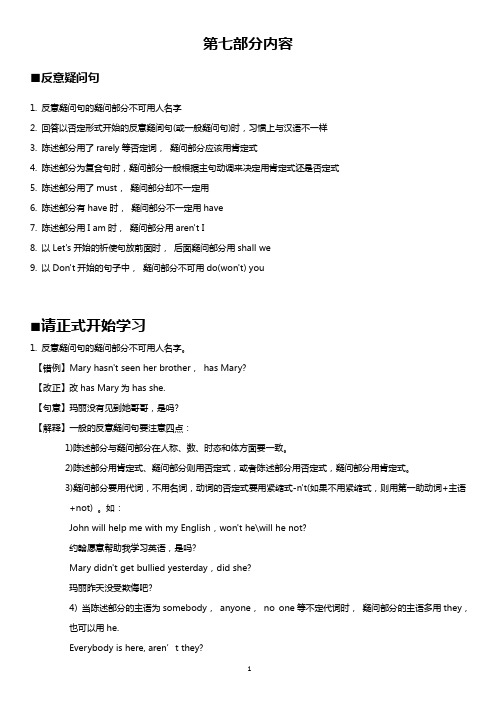
第七部分内容■反意疑问句1. 反意疑问句的疑问部分不可用人名字2. 回答以否定形式开始的反意疑间句(或一般疑问句)时,习惯上与汉语不一样3. 陈述部分用了rarely等否定词,疑问部分应该用肯定式4. 陈述部分为复合句时,疑问部分一般根据主句动调来决定用肯定式还是否定式5. 陈述部分用了must,疑问部分却不一定用6. 陈述部分有have时,疑问部分不一定用have7. 陈述部分用I am时,疑问部分用aren't I8. 以Let's开始的祈使句放前面时,后面疑问部分用shall we9. 以Don't开始的句子中,疑问部分不可用do(won't) you■请正式开始学习1. 反意疑问句的疑问部分不可用人名字。
【错例】Mary hasn't seen her brother,has Mary?【改正】改has Mary为has she.【句意】玛丽没有见到她哥哥,是吗?【解释】一般的反意疑问句要注意四点:1)陈述部分与疑问部分在人称、数、时态和体方面要一致。
2)陈述部分用肯定式、疑问部分则用否定式,或者陈述部分用否定式,疑问部分用肯定式。
3)疑问部分要用代词,不用名词,动词的否定式要用紧缩式-n't(如果不用紧缩式,则用第一助动词+主语+not) 。
如:John will help me with my English,won't he\will he not?约翰愿意帮助我学习英语,是吗?Mary didn't get bullied yesterday,did she?玛丽昨天没受欺侮吧?4) 当陈述部分的主语为somebody,anyone,no one等不定代词时,疑问部分的主语多用they,也可以用he.Everybody is here, aren’t they?No one was hurt,were they?Somebody borrowed my pen yesterday,didn't they?2. 回答以否定形式开始的反意疑问句(或一般疑问句)时,习惯上与汉语不一样。
高中英语语法_反意疑问句

(一)特殊情况 (1)陈述部分是I am 时,疑问部分常用 “aren't I?”代替更正式的“am I not? ”。 如: I'm late, aren't I? 我迟到了,是 吗? (2)如陈述部分是“there be”结构时,疑 问部分只需对换there be 的位置即可。如: There's something wrong with your watch, isn't there? 你的手表有毛病,对吗?
但疑问部分仍要用否定式。如:
She dislike it, doesn't she? 她不喜欢它,是吧?
(5)当 neither…nor, both…and 连接陈述 部分的两个主语时,疑问部分的主语常用 复数代词。如:
Both you and I are not wrong, are we? 你和我都不错,是吗?
5.牢记反意疑问句及答语的肯定,否定关系 的一般规则(“+”表示肯定,“—”表示否 定): 问句中:“+,—”或“—,+”。 答句 中:“+,+”或“—,—”。 问中:He doesn't want to buy it, does he? 他不想买它,对吗? 答中:A:Yes, he does. 不,他想买。 B: No, he doesn't. 对,他不想买。
(二)当陈述部分主句的主、谓是 I (We) think(believe, imagine, expect, feel 等)加 that 引导的宾语从句时,疑问部分的主语 (代词)和动词要与从句的一致。如:
I think there is something wrong with the washer, isn't there? 我想洗衣机出了毛病, 对不对?
高考英语反义疑问句

19)否定前缀不能视为否定词, 其反意疑问句仍用否定形式。 It is impossible, isn't it?
He is not unkind to his classmates, is he?
6. 反义疑问句的回答用yes,no 但是,当陈述部分是否定形式时, 回答要按事实。 They don’t work hard, do they? Yes, they do.
反义疑问句 (The Disjunctive Question)又 叫附加疑问句。它表示提问人的 看法,没有把握,需要对方证实。 反义疑问句由两部分组成:前一 部分是一个陈述句,后一部分是 一个简短的疑问句,两部分的人 称时态应保持一致。
1.陈述部分肯定式 + 疑问部分 否定式 They work here, don’t they? She was ill yesterday, wasn’t she?
不, 他们工作努力。 No, they don’t. 对, 他们工作不努力。
It is a fine day. Let’s go fishing, _sh_a_l_l_w_e_? Let us do this job,_w_i_ll_y_o_u_? Turn on the radio,_w_i_ll_y_o_u_?
18)陈述部分是"there be"结构 的,疑问部分用there省略主语 代词。
Everyone is in the classroom, aren’t they?
Everything begins to grow in spring, doesn’t it?
Nobody will go, will they?
16)带情态动词dare或need的反 意疑问句,疑问部分常用 need (dare ) +主语。
高考英语 高频语法串讲 反义疑问句

高考英语语法专讲:反义疑问句一.概念反意疑问句是附加在陈述句之后,对陈述句所表示的事实或观点提出疑问的句子.附加疑问实际上是一种简略的一般疑问句.二.相关知识点精讲1.反意疑问句的结构:陈述句(主语+谓语……),+助动词/情态动词/be动词+主语(代词形式)?说明:陈述句部分如果是肯定句,反意疑问句,疑问句部分的助动词/情态动词/be动词+not (否定提问);如果陈述句部分是否定句,反意疑问句,疑问句部分用肯定式提问。
例句:He is your teacher, isn’t he?People shouldn’t drop litter on the pavements, should they?You foun d the key in the bedroom, didn’t you?They have a house in town, haven’t they? /don’t they?The boy has to clean his room, doesn’t he?I am right, aren’t I?They’d rather go by bus, wouldn’t they?You’d better change your wet skirt, hadn’t you?He’d like to join our discussion, wouldn’t he?She ought to see a doctor at once, shouldn’t she? / oughtn’t she?I wish to s ay a few words, may I?That’s nice, isn’t it?This i s the place, isn’t it?Everybody knows the answer, don’t they?Nothing is serious, isn’t it?T here wasn’t enough time at that moment, was there?There used to a tower here, usedn’t there? / didn’t there?What you need is more practice, isn’t it?2.某些特殊句型的反意疑问句:1)祈使句的反意疑问句:表示肯定意义的祈使句,即表示“请求,提示”它的反意疑问句用will you 表达:有时也可以用won’t you 表示。
(完整版)高考英语反意疑问句讲解及练习
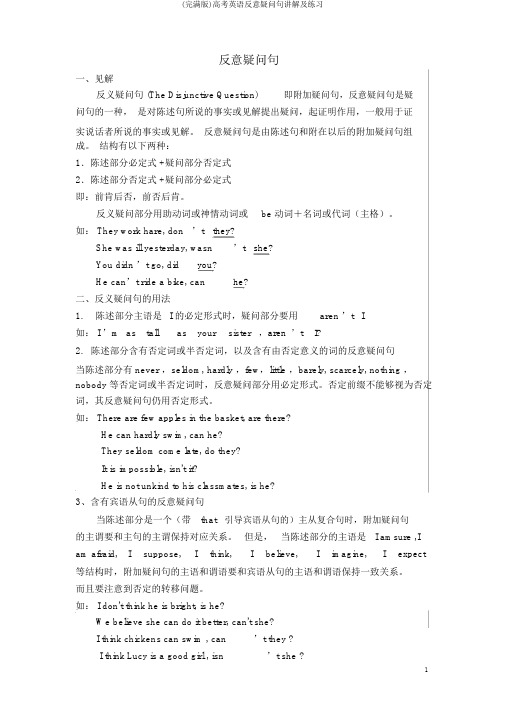
反意疑问句一、见解反义疑问句 (The Disjunctive Question)即附加疑问句,反意疑问句是疑问句的一种,是对陈述句所说的事实或见解提出疑问,起证明作用,一般用于证实说话者所说的事实或见解。
反意疑问句是由陈述句和附在以后的附加疑问句组成。
结构有以下两种:1.陈述部分必定式 +疑问部分否定式2.陈述部分否定式 +疑问部分必定式即:前肯后否,前否后肯。
反义疑问部分用助动词或神情动词或be 动词+名词或代词(主格)。
如: They work hare, don’t they?She was ill yesterday, wasn’t she?You didn ’t go, did you?He can’t ride a bike, can he?二、反义疑问句的用法1. 陈述部分主语是I 的必定形式时,疑问部分要用aren ’t I.如: I ’m as tall as your sister,aren’t I?2.陈述部分含有否定词或半否定词,以及含有由否定意义的词的反意疑问句当陈述部分有 never ,seldom, hardly ,few,little ,barely, scarcely, nothing ,nobody 等否定词或半否定词时,反意疑问部分用必定形式。
否定前缀不能够视为否定词,其反意疑问句仍用否定形式。
如: There are few apples in the basket, are there?He can hardly swim, can he?They seldom come late, do they?It is impossible, isn't it?He is not unkind to his classmates, is he?3、含有宾语从句的反意疑问句当陈述部分是一个(带that引导宾语从句的)主从复合句时,附加疑问句的主谓要和主句的主谓保持对应关系。
高考英语反义疑问句

请注意以下句型的反义疑 问句的用法:
1)陈述部分的主语是I,疑问部 分要用 aren't I.
I‘m as tall as your sister, aren't I?
I am a student, aren’t I
2)陈述部分的谓语是wish,疑 问部分要用may +主语
I wish to have a word with you, may I?
18)陈述部分是"there be"结构 的,疑问部分用there省略主语 代词。
There is something wrong with your watch, isn't there? There will not be any trouble, will there? There were many people in the room then, weren’t there?
Let's go and listen to the music, shall we? Let us wait for you in the reading-room, will you ?
It is a fine day. Let’s go fishing, _sh_a_l_l_w_e_? Let us do this job,_w_i_ll_y_o_u_? Turn on the radio,_w_i_ll_y_o_u_?
b.带有定语从句,宾语从句 的主从复合句,疑问部分谓 语根据主句的谓语而定:
He is not the man who gave us a talk, is he? He said he wanted to visit Japan, didn't he?
高中英语复习 反义疑问句 (共27张PPT)
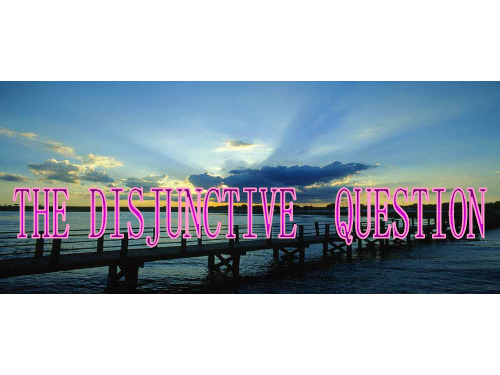
4. 完成时的反意疑问句
主语+have/has+过去分词…, haven’t (hasn’t) + 主语? He has been to America, hasn’t he ? Marry hasn’t lived in the countryside, has she ? You haven’t been to Shanghai, have you ?
简单句的反义疑问句
1.含有be动词(is, are, was, were)的句型: 现在: 主语+is (are)…, isn’t (aren’t) + 主语? 过去: 主语+was (were)…,wasn’t (weren’t) + 主语? are you You are not students, _______? The students are going to have a picnic,_______________ aren’t they ? were they ? The Greens weren’t at home last night, ______________
反意疑问句的解答步骤
1. 判定(判断该用肯定还是否定); 2. 找动(确定句子的助动词类型或情态动词:be、do 和完成have的适当形式以及情态动词的形式); 3. 换代(将主语换为代词);
Jack wasn’t playing soccer, ____ was ___? he Their parents have gone to London, haven’t they ___________? have I___? I have never been to the park, ____ don’t you You have a good friend, ______ ____? didn’t ____? we We had a meeting, _____
高三英语反义疑问句

19)否定前缀不能视为否定词, 其反意疑问句仍用否定形式。 It is impossible, isn't it?
He is not unkind to his classmates, is he?
6. 反义疑问句的回答用yes,no 但是,当陈述部分是否定形式时, 回答要按事实。 They don’t work hard, do they? Yes, they do.
18)陈述部分是"there be"结构 的,疑问部分用there省略主语 代词。
There is something wrong with your watch, isn't there? There will not be any trouble, will there? There were many people in the room then, weren’t there?
பைடு நூலகம்
请注意以下句型的反义疑 问句的用法:
1)陈述部分的主语是I,疑问部 分要用 aren't I.
I‘m as tall as your sister, aren't I?
I am a student, aren’t I
2)陈述部分的谓语是wish,疑 问部分要用may +主语
I wish to have a word with you, may I?
反义疑问句 (The Disjunctive Question)又 叫附加疑问句。它表示提问人的 看法,没有把握,需要对方证实。 反义疑问句由两部分组成:前一 部分是一个陈述句,后一部分是 一个简短的疑问句,两部分的人 称时态应保持一致。
1.陈述部分肯定式 + 疑问部分 否定式 They work here, don’t they? She was ill yesterday, wasn’t she?
英语语法复习(反意疑问句)

一、如果陈述部分是something, anything, nothing, everything等不定代词作句子主语时,疑问部分的主语用"it"代替;如果陈述部分的主语是someone (somebody), anyone (anybody), no one(nobody),everyone (everybody)等不定代词时,疑问部分的主语用"they"代替。
例如:Everything goes very well, doesn't it?Something is wrong with that TV set, isn't it?Someone stole my watch, didn't they?Everyone went to the zoo last Sunday, didn't they?Nobody is late for school, are they?注:nothing在陈述部分中若做主语时,疑问部分用肯定形式,若做宾语或表语时,疑问部分用肯定形式或否定形式均可。
例如:Nothing happens, does it?(nothing 做主语)The manager knew nothing about that project, did/didn't he?(nothing 做宾语)She is nothing to me, is/isn't she?(nothing做表语)二、若陈述部分的主语是this, that时,疑问部分的主语用"it"代替;若陈述部分的主是these, those时,则疑问部分的主语用"they"代替。
例如:This is an interesting story, isn't it?Those are your classmates, aren't they?三、若陈述部分的主语是动词不定式、动名词及从句时,疑问部分的主语用"it"代替。
2022年高考英语备考之语法反义疑问句与倒装句详解

语法:反义疑问句与倒装句详解反意疑问句和倒装句一、反意疑问句(disjunctive questions/ tag questions)1.前一句是肯定句,后面要用否定问句;前面是否定句,包括句子里带有否定意义的词如never, seldom, hardly, scarcely, rarely, few, little, no, nothing, none 等,后面要用肯定问句。
eg. He has made few friends in his class, has he?You seldom meet with this kind of matter, do you?She said nothing at the meeting, did she?但是要注意,impossible, dissatisfy, uncomfortable这类词不是否定词。
eg. He is impossible to finish the work by himself, isn’t he?The result of the maths exam dissatisfied yo u, didn’t it?You failed to pass the test, didn’t you?2.前后的人称要一致,但后面的问句中只能用代词,不能用名词。
如果前面的主语是everything, anything, something,nothing那么在问句中用it作主语;如果前面是everyone, everybody, no one, nobody, someone, somebody, anyone, anybody, those, all(指人)等词作主语,那么后面问句可以用he或者they作主语,现在用they 更加普遍。
eg. Everything is ready, isn’t it?Nothing can prevent him from working, can it?Everyone in the village knew the man, didn’t they/ he?如果是there be的句型,那么后面的问句就用引导词there。
高中英语语法 反意疑问句

B.复杂情况
(一)当陈述部分的主语是从句、不定式 (短语)、动名词等时,疑问部分的主语 一律用it 。如: Whether they will come or not doesn't matter too much, does it?(主语从句作陈 述句的主语)
Packing the suitcase has taken up a whole moring, hasn't it?(动名词短语作陈 述句的主语)
(二)当陈述部分主句的主、谓是 I (We) think(believe, imagine, expect, feel 等)加 that 引导的宾语从句时,疑问部分的主语 (代词)和动词要与从句的一致。如:
I think there is something wrong with the washer, isn't there? 我想洗衣机出了毛病, 对不对?
5.牢记反意疑问句及答语的肯定,否定关系 的一般规则(“+”表示肯定,“—”表示否 定): 问句中:“+,—”或“—,+”。 答句 中:“+,+”或“—,—”。 问中:He doesn't want to buy it, does he? 他不想买它,对吗? 答中:A:Yes, he does. 不,他想买。 B: No, he doesn't. 对,他不想买。
4.在回答前否定(陈述句)+后肯定(简略 问句)的反意疑问句时,答语中“yes ”和 “no”的翻译恰好与汉语相反,如: He isn't a pianist, is he? 他不是钢琴家,是吗? Yes , he is . (No, he isn't.)
高中英语语法 反意疑问句

反意疑问句1. 反意疑问句的概念反意疑问句(Tag Question)也叫附加疑问句,指的是在陈述句后面附加一个简短的一般疑问句,用于对陈述句所说的事实或观点提出疑问或表示证实。
反意疑问句由助动词或情态动词加主语(常与陈述句的主语一致)构成,前有逗号,后有问号。
陈述部分与附加部分的动词时态和动词性质应保持一致,但是肯定和否定形式却彼此相反,即陈述部分为肯定式时,疑问句部分用否定式;陈述部分为否定式时,附加部分用肯定式。
如:He’s late, isn’t he?他迟到了,不是吗?He isn’t late, is he? 他没有迟到,不是吗?反意疑问句的附加部分不管是肯定的,还是否定的,通常都可翻译为“是吗”“对吗”“是不是”“对不对”“不是吗”“不对吗”等。
如:—John likes tea, doesn’t he? 约翰喜欢喝茶,不是吗?肯定回答:—Yes, he does. 是的,他喜欢喝。
否定回答:—No, he doesn’t. 不,他不喜欢。
2. 反意疑问句的缩写问题当反意疑问句的附加部分为否定式时,习惯上只用缩写形式,不能分开来写。
如:正:You love him very much, don’t you? 你很爱他,对不对?误:You love him very much, do not you?3. 反意疑问句的主语问题反意疑问句部分的主语应与陈述部分主语一致,且只能是代词,不能是名词。
如:正:Jim likes English very much, doesn’t he?吉姆很喜欢英语,对吗?误:Jim likes English very much, doesn’t Jim?如果陈述部分的主语是指示代词或不定代词等,在附加部分应改用相应的人称代词。
如:That is a wallet, isn’t it?这是个钱包,是吗?Nothing is serious, isn’t it?一点也不严重,对吗?★注意,如果陈述部分的主语为somebody, someone, everyone, everybody, no one, nobody等指人的复合不定代词时,其附加部分的主语在正式文体中用he,在口语或非正式文体中通常用they。
高中英语语法讲解反义疑问句
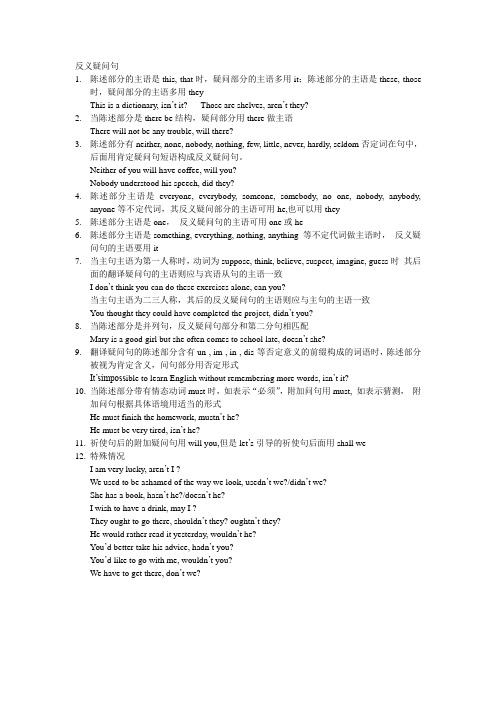
反义疑问句1.陈述部分的主语是this, that时,疑问部分的主语多用it;陈述部分的主语是these, those时,疑问部分的主语多用theyThis is a dictionary, isn’t it? Those are shelves, aren’t they?2.当陈述部分是there be结构,疑问部分用there做主语There will not be any trouble, will there?3.陈述部分有neither, none, nobody, nothing, few, little, never, hardly, seldom否定词在句中,后面用肯定疑问句短语构成反义疑问句。
Neither of you will have coffee, will you?Nobody understood his speech, did they?4.陈述部分主语是everyone, everybody, someone, somebody, no one, nobody, anybody,anyone等不定代词,其反义疑问部分的主语可用he,也可以用they5.陈述部分主语是one,反义疑问句的主语可用one或he6.陈述部分主语是something, everything, nothing, anything 等不定代词做主语时,反义疑问句的主语要用it7.当主句主语为第一人称时,动词为suppose, think, believe, suspect, imagine, guess时其后面的翻译疑问句的主语则应与宾语从句的主语一致I don’t think you can do these exercises alone, can you?当主句主语为二三人称,其后的反义疑问句的主语则应与主句的主语一致You thought they could have completed the project, didn’t you?8.当陈述部分是并列句,反义疑问句部分和第二分句相匹配Mary is a good girl but she often comes to school late, doesn’t she?9.翻译疑问句的陈述部分含有un-, im-, in-, dis-等否定意义的前缀构成的词语时,陈述部分被视为肯定含义,问句部分用否定形式It’simposs ible to learn English without remembering more words, isn’t it?10.当陈述部分带有情态动词must时,如表示“必须”,附加问句用must, 如表示猜测,附加问句根据具体语境用适当的形式He must finish the homework, mustn’t he?He must be very tired, isn’t he?11.祈使句后的附加疑问句用will you,但是let’s引导的祈使句后面用shall we12.特殊情况I am very lucky, aren’t I ?We used to be ashamed of the way we look, usedn’t we?/didn’t we?She has a book, hasn’t he?/doesn’t he?I wish to have a drink, may I ?They ought to go there, shouldn’t they? oughtn’t they?He would rather read it yesterday, wouldn’t he?You’d better take his advice, hadn’t you?You’d like to go with me, wouldn’t you?We have to get there, don’t we?语法填空之反意疑问句(学生版)完成下列句子1、Few of them hurt themselves in the accident last night,___________ ?2.--You’ve never seen dinosaur eggs, have you ?--_______________. How I wish to visit the Dinosaur World.3、His sister had a bad cough, _________she?4、Mr. Green went to Shenzhen on business last week,________?5. John can hardly understand any Chinese, _________he?6、Don’t smoke in th e meeting-room,_________?7、Lucy, you clean the blackboard today,_______ ?8. Miss Cheng will never forget her first visit to Canada ,________?9、The lady couldn’t say a word when she saw the snake,__________?10、__________the population of china? 1,300,000,000.11、---______I go and meet you at the airport?---No ,thanks, dear . I can take a taxi home.12、------________is the Confucian Temple(孔庙) from here?------It’s about 10 minutes’ walk.13、-----_________may I keep these books?-----two weeks.14、Tina is unhappy now,____________?15、---You won’t follow his example, will you ?---________________,I don’t think he is right.16、----__________do you go to Hong Kong?----sorry , I’ve never been there.17、---The boy has to stay at home to look after his little sister,_________?---Yes, because his mother has gone shopping.18、----You lent me some money a few months ago.-----_________? I don’t remember lending you any money .19、My uncle has never been to a foreign country,_____________?20、There is some water in that bottle, ___________?21、----_____________will the foreign students be back from NanJing?----In two days, I think .22、---Let’s go and play football,__________?---That’s wonderf ul.23. I don’t think that the necklace is made of diamond, __________?24. His wife had the carpets and the curtains cleaned, ____________?25.It’s my son’s wedding next week, and I have to do my best for that,__________?26.Harry wouldn’t become a teacher if it hadn’t been for the holiday, __________?27. No one left here yesterday,_____________?28. Birds rarely build nests in our garden,_____________?29. You must have been to the Great Wall,____________?30. Learning how to repair motors takes a long time, _____________?31.They must have stayed at home last night,____________?32.There’s not much news in today’s newspaper, _____________?33.They need our help badly at the moment, ______________?34.She is unfit for the position, _____________?35.I wish to visit America, _____________?36.She’s been a worker here for many years,______________?37.What beautiful flowers,______________?38.Mother used to live in a poor village,____________?39.You’d better go at once, _____________?40.I am very interested in Mark Twain’s novels,____________?41. He never gets up late , ?42. Don’t go out ,?43.Everything begins to grow in spring, ?44.He can hardly finish the work, ?45.Let us go home , ?46. You think he is a good student, ?47.Nobody knows where she lives, ?48.Few students can answer the question, ?49. You needn’t attend the meeting, ______________________?50. We need to come on Sunday, ________________?语法填空之反意疑问句(学生版)完成下列句子1、Few of them hurt themselves in the accident last night,___________ ?2.--You’ve never seen dinosaur eggs, have yo u ?--_______________. How I wish to visit the Dinosaur World.3、His sister had a bad cough, _________she?4、Mr. Green went to Shenzhen on business last week,________?5. John can hardly understand any Chinese, _________he?6、Don’t smoke in the meeting-room,_________?7、Lucy, you clean the blackboard today,_______ ?8. Miss Cheng will never forget her first visit to Canada ,________?9、The lady couldn’t say a word when she saw the snake,__________?10、__________the population of china? 1,300,000,000.11、---______I go and meet you at the airport?---No ,thanks, dear . I can take a taxi home.12、------________is the Confucian Temple(孔庙) from here?------It’s about 10 minutes’ walk.13、-----_________may I keep these books?-----two weeks.14、Tina is unhappy now,____________?15、---You won’t follow his example, will you ?---________________,I don’t think he is right.16、----__________do you go to Hong Kong?----sorry , I’ve never been there.17、---The boy has to stay at home to look after his little sister,_________?---Yes, because his mother has gone shopping.18、----You lent me some money a few months ago.-----_________? I don’t remember lending you any money .19、My uncle has never been to a foreign country,_____________?20、There is some water in that bottle, ___________?21、----_____________will the foreign students be back from NanJing?----In two days, I think .22、---Let’s go and play football,__________?---That’s wonderful.23. I don’t think that the necklace is made of diamond, __________?24. His wife had the carpets and the curtains cleaned, ____________?25.It’s my son’s wedding next week, and I have to do my best for that,__________?26.Harry wouldn’t become a teacher if it hadn’t been for the holiday, __________?27. No one left here yesterday,_____________?28. Birds rarely build nests in our garden,_____________?29. You must have been to the Great Wall,____________?30. Learning how to repair motors takes a long time, _____________?31.They must have stayed at home last night,____________?32.There’s not much news in today’s newspaper, _____________?33.They need our help badly at the moment, ______________?34.She is unfit for the position, _____________?35.I wish to visit America, _____________?36.She’s been a worker here for many years,______________?37.What beautiful flowers,______________?38.Mother used to live in a poor village,____________?39.You’d better go at once, _____________?40.I am very interest ed in Mark Twain’s novels,____________?41. He never gets up late , ?42. Don’t go out ,?43.Everything begins to grow in spring, ?44.He can hardly finish the work, ?45.Let us go home , ?46. You think he is a good student, ?47.Nobody knows where she lives, ?48.Few students can answer the question, ?49. You needn’t attend the meeting, ______________________?50. We need to come on Sunday, ________________?语法填空之反意疑问句(教师版)完成下列句子1、Few of them hurt themselves in the accident last night,___________ ? did they2.--You’ve never seen dinosaur eggs, have you ?No, I haven’t--_______________. How I wish to visit the Dinosaur World.3、His sister had a bad cough, _________she?didn’t4、Mr. Green went to Shenzhen on business last week,________?didn’t he5. John can hardly understand any Chinese, _________he? can6、Don’t smo ke in the meeting-room,_________? will you7、Lucy, you clean the blackboard today,_______ ?will you8. Miss Cheng will never forget her first visit to Canada ,________? will she9、The lady couldn’t say a word when she saw the snake,__________? could she10、__________the population of china? 1,300,000,000. What’s11、---______I go and meet you at the airport? Shall---No ,thanks, dear . I can take a taxi home.12、------________is the Confucian Temple(孔庙) from here? How far------It’s about 10 minutes’ walk.13、-----_________may I keep these books? How long-----two weeks.14、Tina is unhappy now,____________?isn’t she15、---You won’t follow his example, will you ?---________________,I don’t think he is right.No, I won’t16、----__________do you go to Hong Kong? How often----sorry , I’ve never been there.17、---The boy has to stay at home to look after his little sister,_________? doesn’t he---Yes, because his mother has gone shopping.18、----You lent me some money a few months ago.-----_________? I don’t remember lending you any money . Did I19、My uncle has never been to a foreign country,_____________? has he20、There is some water in that bottle, ___________? isn’t there21、----_____________will the foreign students be back from NanJing?----In two days, I think . How soon22、---Let’s go and play football,__________? shall we---That’s wonderful.23. I don’t think that the necklace is made of diamond, __________? is it24. His wife had the carpets and the curtains cleaned, ____________? didn’t she25.It’s my son’s wedding next week, and I have to do my best for that,__________? don’t I26.Harry wouldn’t become a teacher if it hadn’t been for the holiday, __________? would he27. No one left here yesterday,_____________? did they28. Birds rarely build nests in our garden,_____________? do they29. You must have been to the Great Wall,____________? haven’t you30. Learning how to repair motors takes a long time, _____________? doesn’t it31.They must have stayed at home last night,____________? didn’t they32.There’s not much news in today’s newspaper, _____________? is there33.They need our help badly at the moment, ______________? don’t they34.She is unfit for the position, _____________? isn’t she35.I wish to visit America, _____________? may I36.She’s been a worker here for many years,______________? hasn’t she37.What beautiful flowers,______________? aren’t they38.Mother used to live in a poor village,____________? usedn’t she/didn’t she39.You’d better go at once, _____________? hadn’t you40.I am very interested in Mark Twain’s novels,____________? aren’t I41. He never gets up late , ?does he42. Don’t go out ,?will you43.Everything begins to grow in spring, ?doesn’t it44.He can hardly finish the work, ?can he45.Let us go home , ? will you46. You think he is a good student, ?don’t you47.Nobody knows where she lives, ? dothey/does he48.Few students can answer the question, ?can they49. You needn’t attend the meeting, ______________________? need you50. We need to come on Sunday, ________________? do n’t we。
高三英语反义疑问句

请注意以下句型的反义疑 问句的用法:
1)陈述部分的主语是I,疑问部 分要用 aren't I.
I‘m as tall as your sister, aren't I?
I am a student, aren’t I
2)陈述部分的谓语是wish,疑 问部分要用may +主语
19)否定前缀不能视为否定词, 其反意疑问句仍用否定形式。 It is impossible, isn't it?
He is not unkind to his classmates, is he?
6. 反义疑问句的回答用yes,no 但是,当陈述部分是否定形式时, 回答要按事实。 They don’t work hard, do they? Yes, they do.
18)陈述部分是"there be"结构 的,疑问部分用there省略主语 代词。
There is something wrong with your watch, isn't there? There will not be any trouble, will there? There were many peoቤተ መጻሕፍቲ ባይዱle in the room then, weren’t there?
I wish to have a word with you, may I?
17)省去主语的祈使句的反意疑 问句,疑问部分用will you。 Don't do that again, will you?
Go with me, will you / won't you ?
注意:Let's 开头的祈使句,后 用shall we? Let us 开头的祈使句,后 用will you?
英语语法:反义疑问句专项讲解
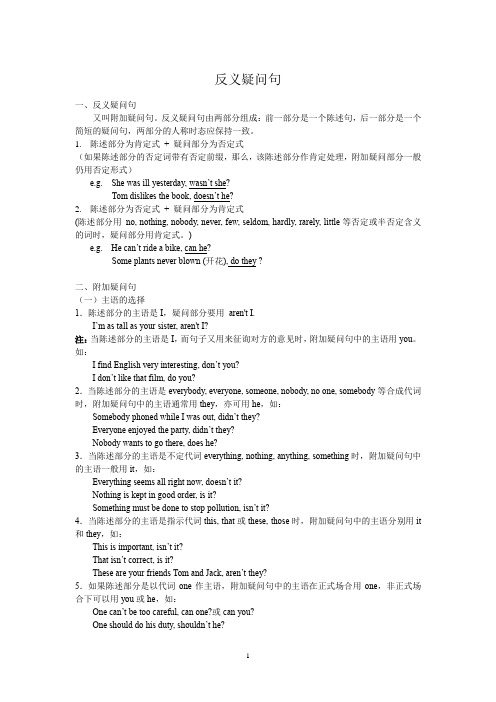
反义疑问句一、反义疑问句又叫附加疑问句。
反义疑问句由两部分组成:前一部分是一个陈述句,后一部分是一个简短的疑问句,两部分的人称时态应保持一致。
1.陈述部分为肯定式+ 疑问部分为否定式(如果陈述部分的否定词带有否定前缀,那么,该陈述部分作肯定处理,附加疑问部分一般仍用否定形式)e.g. She was ill yesterday, wasn’t she?Tom dislikes the book, doesn’t he?2.陈述部分为否定式+ 疑问部分为肯定式(陈述部分用no, nothing, nobody, never, few, seldom, hardly, rarely, little等否定或半否定含义的词时,疑问部分用肯定式。
)e.g. He can’t ride a bike, can he?Some plants never blown (开花), do they ?二、附加疑问句(一)主语的选择1.陈述部分的主语是I,疑问部分要用aren't I.I’m as tall as your sister, aren't I?注:当陈述部分的主语是I,而句子又用来征询对方的意见时,附加疑问句中的主语用you。
如:I find English very interesting, don’t you?I don’t like that film, do you?2.当陈述部分的主语是everybody, everyone, someone, nobody, no one, somebody等合成代词时,附加疑问句中的主语通常用they,亦可用he,如:Somebody phoned while I was out, didn’t they?Everyone enjoyed the party, didn’t they?Nobody wants to go there, does he?3.当陈述部分的主语是不定代词everything, nothing, anything, something时,附加疑问句中的主语一般用it,如:Everything seems all right now, doesn’t it?Nothing is kept in good order, is it?Something must be done to stop pollution, isn’t it?4.当陈述部分的主语是指示代词this, that或these, those时,附加疑问句中的主语分别用it 和they,如:This is important, isn’t it?That isn’t correct, is it?These are your friends Tom and Jack, aren’t they?5.如果陈述部分是以代词one作主语,附加疑问句中的主语在正式场合用one,非正式场合下可以用you或he,如:One can’t be too careful, can one?或can you?One should do his duty, shouldn’t he?6.当陈述句为there be结构时,附加疑问句中的主语也用there。
高中英语语法:反义疑问句专项讲解(含答案)
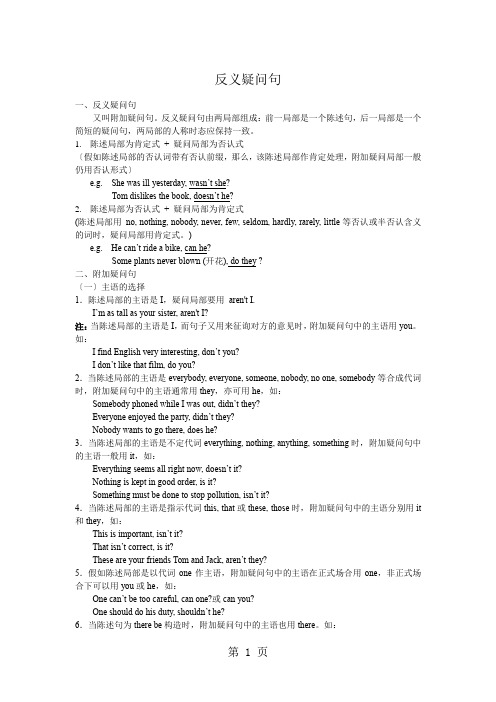
反义疑问句一、反义疑问句又叫附加疑问句。
反义疑问句由两局部组成:前一局部是一个陈述句,后一局部是一个简短的疑问句,两局部的人称时态应保持一致。
1.陈述局部为肯定式+ 疑问局部为否认式〔假如陈述局部的否认词带有否认前缀,那么,该陈述局部作肯定处理,附加疑问局部一般仍用否认形式〕e.g. She was ill yesterday, wasn’t she?Tom dislikes the book, doesn’t he?2.陈述局部为否认式+ 疑问局部为肯定式(陈述局部用no, nothing, nobody, never, few, seldom, hardly, rarely, little等否认或半否认含义的词时,疑问局部用肯定式。
)e.g. He can’t ride a bike, can he?Some plants never blown (开花), do they ?二、附加疑问句〔一〕主语的选择1.陈述局部的主语是I,疑问局部要用aren't I.I’m as tall as your sister, aren't I?注:当陈述局部的主语是I,而句子又用来征询对方的意见时,附加疑问句中的主语用you。
如:I find English very interesting, don’t you?I don’t like that film, do you?2.当陈述局部的主语是everybody, everyone, someone, nobody, no one, somebody等合成代词时,附加疑问句中的主语通常用they,亦可用he,如:Somebody phoned while I was out, didn’t they?Everyone enjoyed the party, didn’t they?Nobody wants to go there, does he?3.当陈述局部的主语是不定代词everything, nothing, anything, something时,附加疑问句中的主语一般用it,如:Everything seems all right now, doesn’t it?Nothing is kept in good order, is it?Something must be done to stop pollution, isn’t it?4.当陈述局部的主语是指示代词this, that或these, those时,附加疑问句中的主语分别用it 和they,如:This is important, isn’t it?That isn’t correct, is it?These are your friends Tom and Jack, aren’t they?5.假如陈述局部是以代词one作主语,附加疑问句中的主语在正式场合用one,非正式场合下可以用you或he,如:One can’t be too careful, can one?或can you?One should do his duty, shouldn’t he?6.当陈述句为there be构造时,附加疑问句中的主语也用there。
- 1、下载文档前请自行甄别文档内容的完整性,平台不提供额外的编辑、内容补充、找答案等附加服务。
- 2、"仅部分预览"的文档,不可在线预览部分如存在完整性等问题,可反馈申请退款(可完整预览的文档不适用该条件!)。
- 3、如文档侵犯您的权益,请联系客服反馈,我们会尽快为您处理(人工客服工作时间:9:00-18:30)。
9)陈述部分有You'd like to + v. 疑问部分用wouldn't +主语。
You‘d like to go with me, wouldn't you?
10)must在表示"推测"时,根据其 推测的情况来确定反意疑问句。
He must be a doctor, isn't he? You must have studied English for three years, haven't you? He must have finished it yesterday, didn't he? It must be going to rain tomorrow, won't it?
反义疑问句
(The Disjunctive Question)又 叫附加疑问句。它表示提问人的 看法,没有把握,需要对方证实。 反义疑问句由两部分组成:前一 部分是一个陈述句,后一部分是 一个简短的疑问句,两部分的人 称时态应保持一致。
1.陈述部分肯定式 + 疑问部分 否定式
They work here, don’t they?
a.并列复合句疑问部分,谓语动 词根据邻近从句的谓语而定。
As Mr. Smith had been to Beijing for several times, he should have been in China now, shouldn't he?
b.带有定语从句,宾语从句 的主从复合句,疑问部分谓 语根据主句的谓语而定:
Either you or he is right,_i_s_n_’t_?he
13)陈述部分主语是指示代词或 不定代词 everything, that, this nothing, 疑问部分主语用 it 。
Everything is ready, isn't it?
14)陈述部分为主语从句或并列 复合句,疑问部分有三种情况:
I‘m as tall as your sister, aren't I?
I am a student, aren’t I
2)陈述部分的谓语是wish,疑 问部分要用may +主语
I wish to have a word with you, may I?
3)陈述部分用 no, nothing, nobody, never, few, seldom, hardly, rarely, little等否定含义 的词时,疑问部分用肯定含义。
11) 感叹句中,疑问部分用 be +主语。
What colours, aren't they?
What a smell, isn't it?
12)陈述部分由neither… nor, either… or 连接的并列主语时, 疑问部分根据其实际逻辑意义 而定。
Neither you nor I am engineer, are we?
You'd better read it by yourself, hadn't you? You’d better get up early, hadn’t you?
8)陈述部分有would rather + v. 疑问部分多用 wouldn't +主语。
He would rather read it ten times than recite it, wouldn't he?
I don't think he is bright, is he? We believe she can do it better, can't she?
15) 陈述部分主语是不定代词 everybody, anyone, somebody, nobody, no one等,疑问部分常 用复数they,有时也用单数he。
He is not the man who gave us a talk, is he? He said he wanted to visit Japan, didn't he?
c. 上述部分主句谓语是I ;we think, believe, expect, suppose, imagine 等引导的宾语从句,疑 问部分与宾语从句相对应构成反 意疑问句。
6)陈述部分的谓语是used to 时, 疑问部分用didn't +主语或 usedn't +主语。
He used to take pictures there, didn't he?
She used to stay up late, usedn’t she?
7)陈述部分有hபைடு நூலகம்d better + v. 疑 问句部分用hadn't you?
She was ill yesterday, wasn’t she?
2.陈述部分否定式 + 疑问部分 肯定式
You didn’t go, did you?
He can’t ride a bike, can he?
请注意以下句型的反义疑 问句的用法:
1)陈述部分的主语是I,疑问部 分要用 aren't I.
5)陈述部分有 have to + v. (had to + v.),疑问部分常用don't + 主语(didn't +主语)。
We have to get there at eight tomorrow, don't we?
They had to cross the busy street, didn’t they?
They seldom e late, do they? She rarely speaks to you in English, does she?
4)含有ought to 的反意疑问句, 陈述部分是肯定的,疑问部分 用shouldn't / oughtn't +主语。
He ought to know what to do, oughtn't he? / shouldn't he?
The Swede made no answer, did he / she? Some plants never blown (开 花), do they ?
There are few apples in the basket, are there? He can hardly swim, can he?
